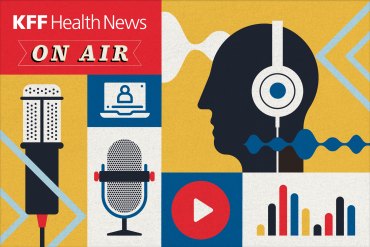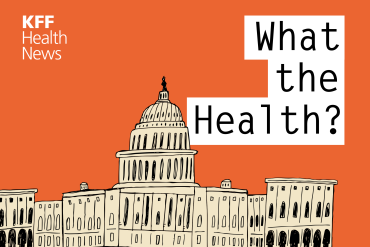With Trump on the Way, Advocates Look to States To Pick Up Medical Debt Fight
Patient and consumer advocates fear a new Trump administration will scale back federal efforts to expand financial protections for patients and shield them from debt.
Journalists Dish on New Weight Loss Drugs, RFK Jr.’s Fluoride Claims, and Reproductive Health
KFF Health News staffers and contributors made the rounds on national and local media this week to discuss their stories. Here’s a collection of their appearances.
What the Health? From KFF Health News: Trump’s Nontraditional Health Picks
Not only has President-elect Donald Trump chosen prominent vaccine skeptic Robert F. Kennedy Jr. to lead the Department of Health and Human Services, Trump also has said he will nominate controversial TV host Mehmet Oz to run the Centers for Medicare & Medicaid Services, which oversees coverage for nearly half of Americans. Meanwhile, the lame-duck Congress is back in Washington with just a few weeks to figure out how to wrap up work for the year. Rachel Cohrs Zhang of Stat, Sandhya Raman of CQ Roll Call, and Riley Ray Griffin of Bloomberg News join KFF Health News’ Julie Rovner to discuss these stories and more. Also this week, Rovner interviews Sarah Varney, who has been covering a trial in Idaho challenging the lack of medical exceptions in that state’s abortion ban.
Florida Gov. DeSantis’ Canadian Drug Import Plan Goes Nowhere After FDA Approval
Florida sued the FDA over what it said was a “reckless delay” in approving its drug importation plan. Now, nearly a year after the FDA gave the state the green light, the program has yet to begin.
Ex-Eye Bank Workers Say Pressure, Lax Oversight Led to Errors
Corneas, the windshields of the eye, are the most transplanted part of the human body. But four former employees at Rocky Mountain Lions Eye Bank told of numerous retrieval problems, including damage to eyes and removal from the wrong body.
Tribal Leaders Ask Feds To Declare Syphilis Outbreak a Public Health Emergency
For Native American communities in the Great Plains, data paints a clear picture of the devastation caused by an ongoing syphilis outbreak. According to the South Dakota Department of Health, 649 cases of syphilis have been documented this year. Of those, 546 were diagnosed among Native Americans, who make up only 9 percent of the […]
Hospitals Adjust as Rates of Maternal High Blood Pressure Spike
Health researchers are noticing a growing problem in American pregnancies: more cases of blood pressure so high it can be deadly for the parent and baby. U.S. rates of newly developed and chronic maternal high blood pressure skyrocketed from 2007 through 2019, and researchers say they haven’t slowed down. Hospitals are working to adjust their […]
Older Americans Living Alone Often Rely on Neighbors or Others Willing To Help
Diverse networks of friends, former co-workers, neighbors, and extended family are often essential sources of support for older adults living alone. Often it is the elderly caring for the elderly.
Tribal Health Leaders Say Feds Haven’t Treated Syphilis Outbreak as a Public Health Emergency
The National Indian Health Board has urged the U.S. Department of Health and Human Services to declare a public health emergency as an alarming syphilis outbreak, which disproportionately affects Native Americans, continues. This is the latest plea for more resources from tribal leaders after previous requests went unanswered.
7 of 10 States Backed Abortion Rights. But Little To Change Yet.
Voters in 10 states weighed in on abortion rights this election. Despite the results supporting abortion rights in seven of those states, much of the abortion landscape on abortion won’t change much immediately, as medical providers navigate the legal hurdles that remain.
A Quick Return to School and Light Exercise May Help Kids Recover From Concussions
With new research and updated guidelines in Colorado and 15 other states, physicians and educators are asking parents not to wait to return their concussed kids to school.
Más de 2 millones de niños a nivel nacional han sido diagnosticados alguna vez con una conmoción o lesión cerebral, según la Encuesta Nacional de Entrevistas de Salud de 2022.
Trump Wants Harris To Pay a Political Price for Generous Immigrant Health Policies
Several Democratic-led states have expanded public insurance programs to cover immigrants in the U.S. regardless of legal status. Donald Trump is trying to blame Kamala Harris for the policies.
Trump quiere que Harris pague un precio político por ofrecer salud a inmigrantes sin papeles
Estados liderados por demócratas, como Illinois, están abriendo cada vez más programas de seguros públicos a inmigrantes sin papeles.
In Montana, Conservative Groups See Chance To Kill Medicaid Expansion
Conservative groups are working to undermine support for Montana’s Medicaid expansion ahead of a political fight over whether to keep the program.
‘Dreamers’ Can Enroll in ACA Plans This Year — But a Court Challenge Could Get in the Way
Nineteen states are seeking to stall a Biden administration rule that would allow recipients of the Deferred Action for Childhood Arrivals program to enroll in ACA coverage and qualify for subsidies. DACA provides work authorization and temporary deportation protection to people brought to the U.S. as children without immigration paperwork.
Del medio millón de beneficiarios de DACA, el gobierno estima que alrededor de 100.000 que anteriormente no tenían seguro podrían inscribirse a partir del 1 de noviembre.
Exclusive: Emails Reveal How Health Departments Struggle To Track Human Cases of Bird Flu
Emails show how health officials struggle to track the bird flu, partly in deference to the agricultural industry. As a result, researchers don’t know how often farmworkers are being infected — and could miss alarming signals.
PBM Math: Big Chains Are Paid $23.55 To Fill a Blood Pressure Rx. Small Drugstores? $1.51.
Criticism of prescription drug middlemen has intensified recently in the wake of a federal agency’s actions and legislative reform attempts. Georgia Republican Gov. Brian Kemp, though, vetoed a related bill that would have helped independent pharmacies, citing the unfunded cost of the move.
Colorado’s Naloxone Fund Is Drying Up, Even as Opioid Settlement Money Rolls In
Since Colorado created a pool of money to pay for naloxone in 2019, it has distributed more than half a million doses of the opioid reversal drug to hundreds of organizations throughout the state. Now, its main funding stream is drying up.























